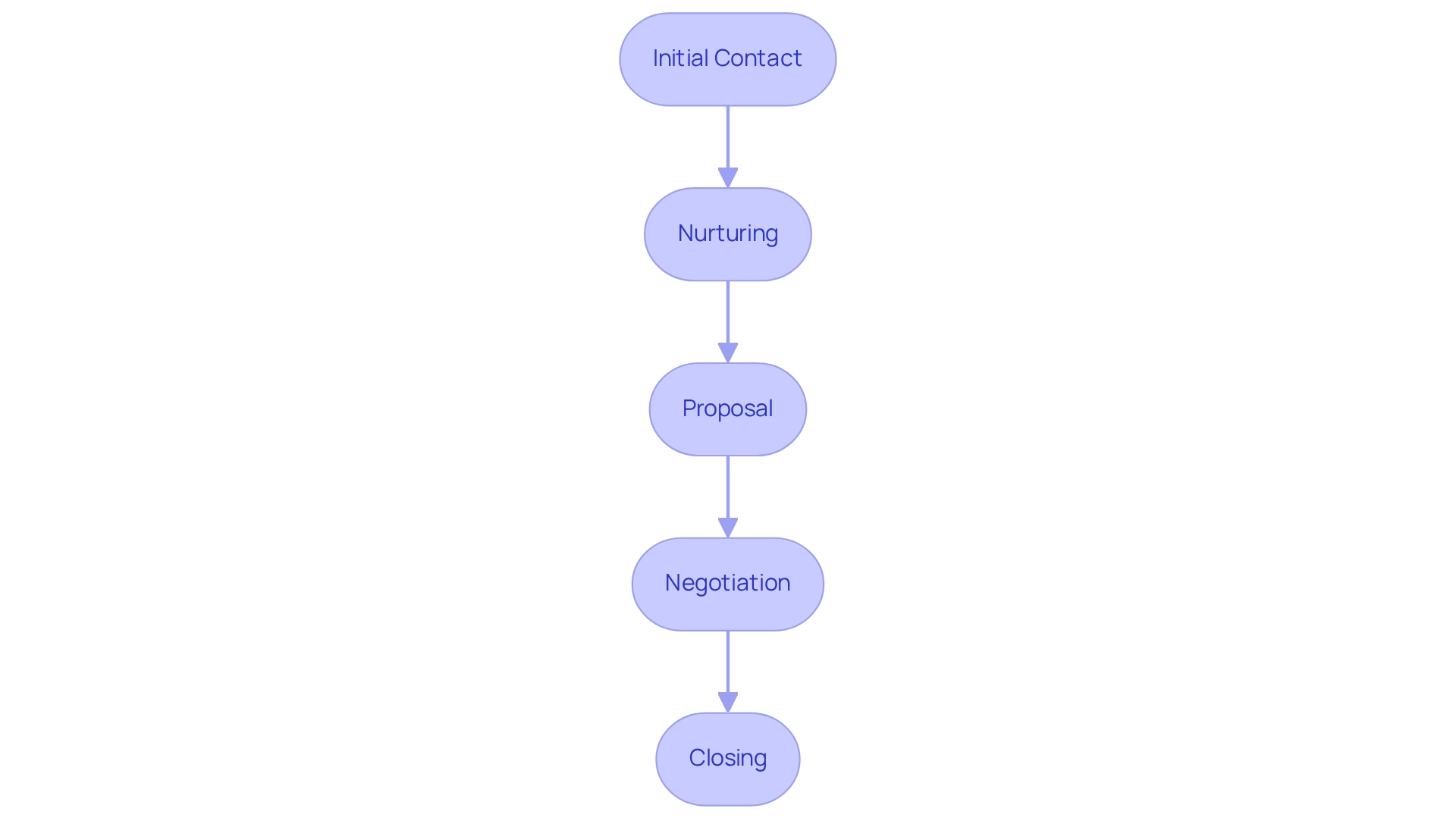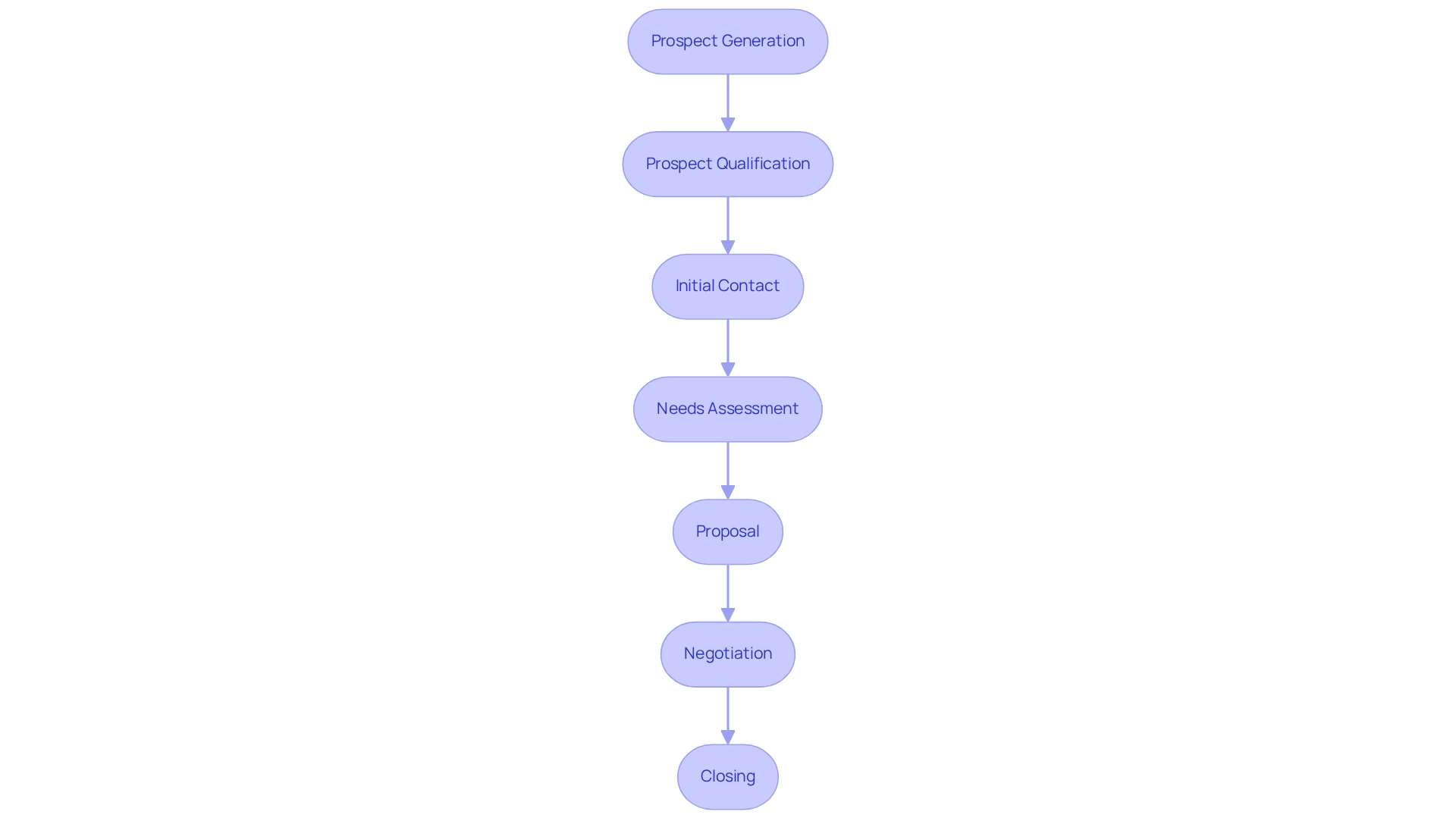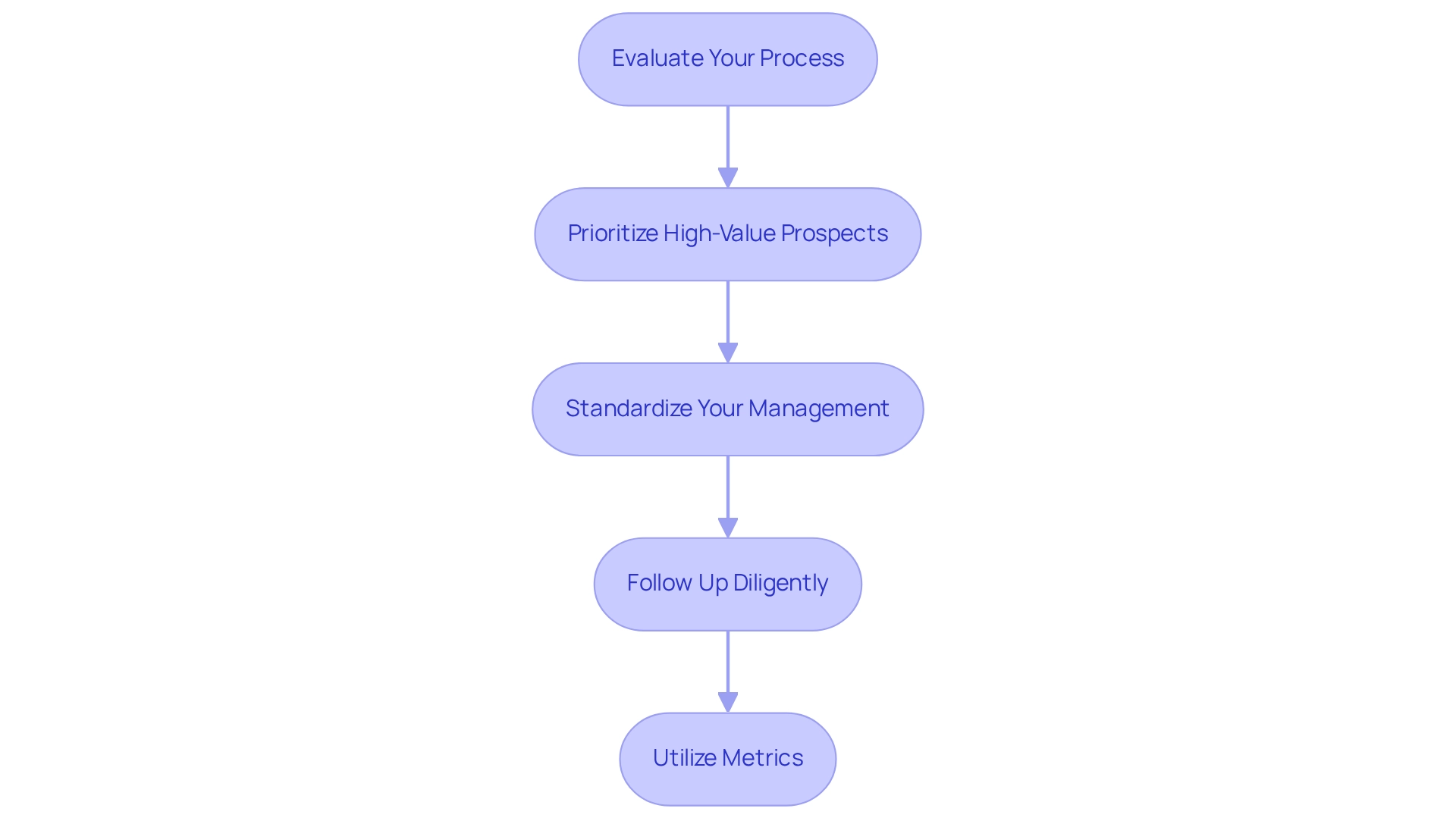Overview
Sales pipeline management is essential for small businesses, as it nurtures potential clients through various stages of the selling cycle. This nurturing ultimately drives revenue growth and enhances forecasting accuracy. By implementing effective management strategies and leveraging technology, businesses can prioritize high-value prospects. Imagine being able to streamline your processes and significantly increase your conversion rates—this is not just a possibility, but an achievable goal.
We understand that navigating the sales process can feel overwhelming at times. However, with the right tools and strategies, you can transform your approach. By focusing on high-value prospects, you not only save time but also increase your chances of success. This is about more than just numbers; it's about building relationships that matter.
Together, we can achieve success in your sales journey. Embrace these strategies to enhance your sales pipeline management and watch as your business flourishes. Remember, every step you take towards effective management is a step towards a brighter future.
Introduction
In the competitive landscape of small business, mastering sales pipeline management is not just an option; it's truly a necessity. This structured approach to overseeing prospects as they journey through the sales cycle—from that very first contact to closing deals—empowers you to track potential customers effectively and refine your sales strategies. By understanding the critical stages of the sales pipeline and implementing best practices, you can enhance your forecasting accuracy and optimize resource allocation.
As technology continues to evolve, leveraging tools like CRM systems and automated outreach platforms becomes vital for improving efficiency and driving revenue growth. We understand your challenges, and this article delves into the importance of effective sales pipeline management. It highlights key stages to monitor, best practices to adopt, and the role of technology in streamlining the sales process. Together, we can explore insights essential for thriving in today's market, ensuring you feel supported every step of the way.
Define Sales Pipeline Management and Its Importance
Sales pipeline management is more than just oversight; it's about nurturing potential clients as they journey through the various stages of the selling cycle, from that first contact to the final agreement. For small business owners, this organized approach is vital. Sales pipeline management allows for efficient tracking of potential clients and fosters a deeper understanding of their needs, ultimately enhancing revenue initiatives.
By effectively implementing sales pipeline management, companies can improve forecasting accuracy and optimize resource allocation—both crucial elements for driving revenue growth. Visualizing the status of each potential client through sales pipeline management empowers businesses to prioritize their efforts strategically, ensuring that no opportunity slips through the cracks. Engaging more stakeholders early in the selling process can significantly boost closing rates, highlighting the importance of sales pipeline management to ensure a well-managed flow of prospects.
Did you know that a conversion rate of 20%—where 20 out of 100 potential clients become customers—demonstrates the potential revenue impact of effective process management? Moreover, case studies, including those related to Wayy.ai, showcase how automated outreach can facilitate the creation of over 60 target client connections each month. This not only enhances sales pipeline management but also does so without the burden of manual effort.
With Wayy.ai's one-click sales strategy and targeted outreach capabilities, small business owners can simplify client acquisition while continually refining their approach based on past interactions. This unique blend of automation and intelligence provides daily email updates that monitor key metrics such as contacts reached and interest shown, while also enhancing conversion rates. It also offers valuable insights into revenue performance.
As small enterprises navigate the complexities of client acquisition in 2025, the importance of efficient sales pipeline management remains a cornerstone for achieving growth and sustained success. Together, we can embrace these strategies to foster a brighter future for our businesses.

Identify Key Stages of the Sales Pipeline
The sales process is a structured framework that consists of several critical stages essential for effective development:
- Prospect Generation - identifying potential customers
- Prospect Qualification - assessing the viability of prospects
- Initial Contact - reaching out to potential clients
- Needs Assessment - understanding customer requirements
- Proposal - presenting tailored solutions
- Negotiation - discussing terms and addressing objections
- Closing - finalizing the transaction
Understanding these phases allows small business owners to oversee their sales efforts more efficiently, ensuring that prospects are nurtured throughout the process. Have you ever wondered how your conversion rates compare? Industry statistics reveal that average conversion rates at each stage can vary significantly, with many businesses achieving an ROI of 107% to 110% through improved management.
Experts emphasize the importance of prospect generation and qualification, as these initial steps lay the foundation for successful sales outcomes. For instance, a cybersecurity company discovered high drop-off rates between the demo and negotiation stages of their pipeline. By implementing targeted incentives, they not only reduced leakage but also enhanced their overall conversion rates.
Moreover, strategies like SEO, content marketing, and personalized emails have proven effective in guiding prospects through the funnel stages, increasing engagement and boosting the chances of closing deals. With Wayy.ai's one-click sales guide, small business owners can optimize their outreach efforts, while daily email insights empower them to track key metrics—such as how many leads were contacted, who expressed interest, and how conversion rates are improving. This data-driven approach fosters informed decision-making and targeted outreach strategies.
By clearly outlining and overseeing each phase of the sales process, small business owners can significantly enhance their revenue performance and stimulate growth. As Wayy.ai highlights, "The connection between an SQL and an opportunity revolves around expressed purchase intent," underscoring the vital importance of understanding customer intent in the selling process. Together, we can navigate these challenges and achieve success.

Implement Best Practices for Effective Pipeline Management
To efficiently oversee your sales pipeline management, let’s explore some best practices together that can truly make a difference:
- Consistently Evaluate Your Process - It’s important to arrange weekly or monthly assessments to understand the condition of your prospects and identify any obstacles they may face. This reflection can help you feel more in control.
- Prioritize High-Value Prospects - Focus your efforts on those prospects that show the greatest potential for conversion. By doing so, you’re investing your time where it matters most.
- Standardize Your Sales Pipeline Management - Developing a consistent approach to managing leads at each phase of the sales pipeline can provide clarity and ease your workload.
- Follow Up Diligently - Remember, timely follow-ups are crucial. They keep your prospects engaged and informed, showing that you genuinely care about their journey.
- Utilize Metrics - Monitoring key performance indicators (KPIs) like conversion rates and revenue velocity can empower you to assess success and make informed decisions.
Together, we can navigate these challenges and find effective solutions.

Leverage Technology and Automation for Pipeline Efficiency
Incorporating technology into sales pipeline management is not just beneficial; it’s essential for enhancing your efficiency. Have you considered how a Customer Relationship Management (CRM) system can automate crucial tasks like lead tracking, follow-ups, and reporting? These elements are vital for sustaining a strong business process.
Platforms like Wayy.ai are designed to empower small business owners like you by automating outreach efforts, simplifying research, and streamlining communication. With features such as a one-click revenue playbook and targeted outreach, Wayy.ai can further improve your selling process.
Imagine receiving daily email updates that provide key metrics on your outreach—how many leads were reached, who showed interest, and how your conversion rates are improving. By leveraging analytics tools, you can gain valuable insights into customer behavior and preferences, enabling you to craft more targeted marketing strategies.
Adopting automation eases manual tasks and minimizes mistakes, significantly boosting your productivity in sales. Effective CRM implementations have demonstrated that functions like process automation and performance reporting can enhance workflows and increase forecasting precision. This allows your team to focus on selling rather than getting bogged down by administrative duties.
As we look ahead to 2025, small businesses that embrace these tools will likely experience significant improvements in their sales pipeline management efficiency. Together, we can navigate these changes and achieve success.
Conclusion
Mastering sales pipeline management is essential for small businesses like yours, especially in today’s competitive marketplace. By systematically overseeing your prospects through the various stages of the sales cycle—from lead generation to closing—you can enhance your forecasting accuracy and optimize resource allocation. Understanding these critical stages allows you to effectively track potential customers and ensures that no opportunities slip through the cracks.
Implementing best practices such as:
- Regular pipeline reviews
- Prioritizing high-value leads
- Utilizing key metrics
empowers you to make informed decisions and streamline your sales processes. Additionally, leveraging technology and automation, such as CRM systems and platforms like Wayy.ai, not only improves efficiency but also fosters stronger engagement with your prospects. Automation alleviates manual workloads, allowing your sales team to focus more on building meaningful relationships and closing deals.
In summary, effective sales pipeline management is not just a strategy; it is a vital component for driving revenue growth and long-term success. By adopting a structured approach, implementing best practices, and embracing technology, you can navigate the complexities of client acquisition in 2025 and beyond. Together, let’s position your small business for sustained success in an ever-evolving market.
Frequently Asked Questions
What is sales pipeline management?
Sales pipeline management is the process of overseeing and nurturing potential clients as they progress through various stages of the selling cycle, from initial contact to final agreement.
Why is sales pipeline management important for small business owners?
It allows small business owners to efficiently track potential clients, understand their needs, and enhance revenue initiatives, ultimately improving forecasting accuracy and optimizing resource allocation.
How does sales pipeline management improve revenue growth?
By visualizing the status of each potential client, businesses can prioritize their efforts strategically, ensuring that no opportunities are missed, which can lead to increased closing rates and revenue growth.
What is a good conversion rate that indicates effective sales pipeline management?
A conversion rate of 20%, meaning 20 out of 100 potential clients become customers, demonstrates the potential revenue impact of effective sales pipeline management.
How can automation enhance sales pipeline management?
Automation, such as that provided by Wayy.ai, can facilitate the creation of over 60 target client connections each month, improving sales pipeline management without the burden of manual effort.
What features does Wayy.ai offer for small business owners?
Wayy.ai offers a one-click sales strategy, targeted outreach capabilities, daily email updates on key metrics, and insights into revenue performance, all of which help simplify client acquisition and enhance conversion rates.
What challenges do small enterprises face in client acquisition in 2025?
Small enterprises navigate complexities in client acquisition, making efficient sales pipeline management crucial for achieving growth and sustained success.




